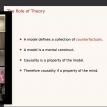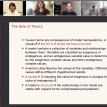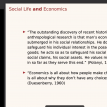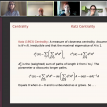The New Economic School, the Human Capital and Economic Opportunity Global Working Group (HCEO) at the University of Chicago, and the China-Russia Eurasian Studies Center (CREC) held online summer school on socioeconomic inequality. The event was organized for the third time, the previous two schools were held in 2017 and in 2019 in Moscow.
The organizers selected 67 postgraduate students and young researchers out of 92 applications. The two previous events gathered only 80 applications in total. The online format also expanded the geography of participants: 23 of them represented Russian universities, 15 students came from European universities, and more than 10 people – from universities of North and South America. There were also some participants from Eurasian countries (Kyrgyzstan, Armenia, Belarus), China, Australia and Benin.
For five days, seven professors from Europe, Russia and the United States shared with the audience modern approaches to the study of inequality, prosperity and related topics, and presented various tools needed for research in this area.
The school opened on June 28 with the lectures on linguistic diversity and inequality by professor Shlomo Weber, president of NES and co-director of CREC, followed by the lectures on intergenerational mobility by Steven Durlauf, professor of the University of Chicago, co-director of HCEO, and NES part-time professor. On the second day, NES Rector Ruben Enikolopov spoke about information and educational inequality, and Rachel Cranton, professor at the Duke University, delivered two lectures on the relationship between people's identity, economic development and the level of inequality. In the morning of June 30, NES Professor Hosni Zoabi talked on the impact of women's empowerment on economic development, after which Petra Todd, professor of the University of Pennsylvania, discussed the possibilities of combining randomized controlled trials with structural modeling.
The fourth day of the school was devoted to poster sessions with the participants presenting the main points of their research with brief texts and graphs, and then discussing them with other students and professors. On the final day, Lawrence Blume, professor at Cornell University, delivered two lectures on economic theory.
"Research on inequality has been conducted for a long time, and interest in this topic is only growing. This school provides its participants with an opportunity to get acquainted with the works by leading professors from the world universities dealing with problems related to various aspects of inequality. We observe a great interest in the school from students and young researchers. The summer school is being held for the third time and has already established itself as a venue of meeting and communicating with top professors and scholars interested in the development of research projects in the field of socioeconomic inequality," Shlomo Weber said.
"For NES, these schools have largely served as an incentive for the development of long-term cooperation with a number of foreign professors. Last year, Steven Durlauf became NES part-time professor, which has already led to the strengthening of the School's cooperation with the University of Chicago. Albert Park (HKUST), chairman of the CREC Academic Committee, promoted the development of cooperation between NES and HKUST. CREC becoming a co-organizer of the school gave a new impetus to its development in terms of both the breadth of research and the geography of participants. In August, we will hold another school on the same topic in partnership with HKUST, which will be mainly aimed at the Chinese audience. A lot has been achieved in 4 years, but the future looks even more interesting and promising," professor Weber added.
About organizers
HCEO is a collaboration of over 500 researchers, educators, and policy makers focused on human capital development and its impact on opportunity inequality. HCEO’s unique approach enables collaboration among scholars with varying disciplines, approaches, perspectives, and fields, and integrates biological, sociological, and psychological perspectives into traditionally economic questions. The result is innovative thinking and approaches to inequality and human capital development research. HCEO is led by Nobel laureate James J. Heckman, the Henry Schultz Distinguished Service Professor of Economics at the University of Chicago; Steven N. Durlauf, Steans Professor in Educational Policy at the Harris School of Public Policy at the University of Chicago; and Robert H. Dugger, the co-founder of ReadyNation and Hanover Provident Capital. HCEO focuses its efforts through six research networks that study the most pressing issues within human capital development and inequality: Early Childhood Interventions; Family Inequality; Health Inequality; Identity and Personality; Inequality: Measurement, Interpretation and Policy; and Markets. These networks produce one-of-a-kind conferences, research programs, and publications that highlight findings from the best science and the application of best practices. Through its networks and their resulting research, HCEO plays a vital role in understanding and addressing opportunity inequality around the world.
The new China-Russia Eurasian Studies Center (CREC) was launched in December 2020 by NES together with the Hong Kong University of Science and Technology (HKUST) and the Moscow School of Management SKOLKOVO. CREC, whose offices are located in Moscow and Guangzhou, aims to become the world’s leading research institution focused on understanding the relationship between China, Russia, and Eurasia by producing interdisciplinary research on the contemporary technological, financial, political, social, economic, and business development in the region. Guided by its Academic Advisory Committee which consists of world renowned scholars, CREC will pursue high-level theoretical, empirical, and applied research to be published in leading professional journals. At the same time it will also aim at making measured but decisive contributions to global and regional public policy debates as well as to business development.






